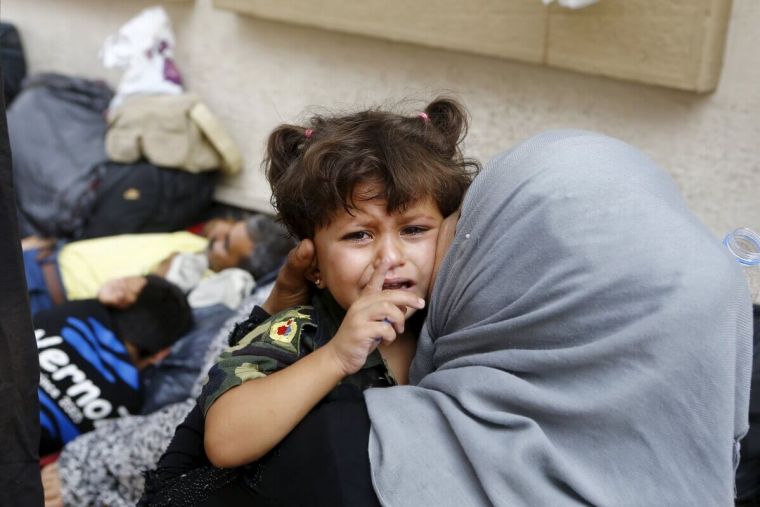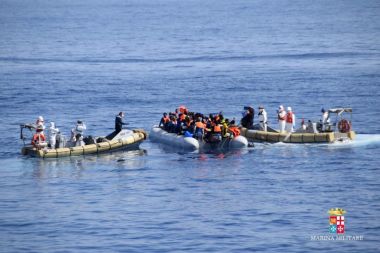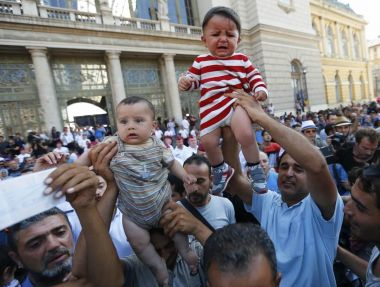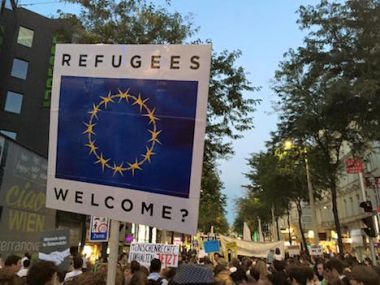Refugee crisis: Why the Bible doesn't allow us to turn our backs on drowning children

Sometimes it really does take a picture to start to change a conversation. In this case it might prove to be the harrowing image of the body of three-year-old Aylan Kurdi, washed up on a Turkish beach, drowned along with his five-year-old brother Galip and their mother Rihan while trying to get to Europe from Syria. Their appeal for asylum in Canada had been turned down.
Europe's refugee crisis is overwhelming not just the services but the institutions which are expected to deal with it. It is forcing the governments of the continent to ask fundamental questions about the nature of the European project. Some countries have nobly taken on more than their fair share of responsibility for refugees. Many others – Britain among them – have been resolute in their refusal to accept more than the minimum decency requires.
In Austria, 20,000 people, horrified by the plight of the refugees, marched in favour of taking more. Iceland, with a population of 330,000, offered to take 50; its government was shamed by the response of its people, 10,000 of whom offered to open their homes to people in need. Germany has offered to take 800,000. Greece and Italy are being overwhelmed. Hungary is building a fence to keep refugees out. Britain took around 10,000 last year; on a per capita basis this makes it one of the meanest countries in Europe. Its answer to the migrants at Calais is more dogs and razor wire.
It's all such a mess. What's clear, however, is that the situation requires a continent-wide response and that the continent has lost its grip.
Does the Church have anything to contribute to the debate about what to do? If it doesn't, it is damned to irrelevance. The migration crisis is the defining humanitarian issue of our times.
But Christians, speaking as Christians, must be very careful to distinguish between what they can say with the authority of the Bible and of two millennia of Christian tradition, and what they can offer as a suggested outworking of that teaching.
First, then, what we can say with the authority of Christ.

1. We should welcome the stranger. In the stark and terrifying parable of the sheep and the goats, Jesus says: "Depart from me, you who are cursed, into the eternal fire prepared for the devil and his angels. For I was hungry and you gave me nothing to eat, I was thirsty and you gave me nothing to drink, I was a stranger and you did not invite me in, I needed clothes and you did not clothe me, I was ill and in prison and you did not look after me" (Matthew 25:41-43). We cannot say to those in need, "You are not our problem."
2. We should be generous, even when it hurts. Paul writes to the Corinthians of the Macedonian church: "In the midst of a very severe trial, their overflowing joy and their extreme poverty welled up in rich generosity. For I testify that they gave as much as they were able, and even beyond their ability" (2 Corinthians 8: 2-3). Compare this with the fears expressed by a senior British politician that Europe would not be able to maintain its standard of living if it welcomed refugees.
3. We should face our own fears and prejudices. Christians should have a critical and wary attitude toward nationalism of any kind. "Our citizenship is in heaven," says Paul in Philippians 3:20; and Revelation is a critique of all secular power and statehood. We should resist being influenced by those who play on our fears of those who might speak a different language, have a different skin tone or hold a different religion. Those who come from elsewhere might bring change, but changes are not threats unless we choose to believe they are.
4. We should not be afraid to go against the flow, and to believe and do unpopular things even when no one else agrees with us. "Let God be true, and every human being a liar," says Paul (Romans 3:4). The actions of our government, or of the European Union, do not absolve us from responsibility to do the right thing as far as we're able, if we truly believe that they are wrong.
5. We should be wise. The book of Proverbs is full of praise for people who know how to organise, plan and make things happen. It says of wisdom: "By me kings reign and rulers issue decrees that are just; by me princes govern, and nobles – all who rule on earth" (Proverbs 8:15). Good intentions are no substitute for hard thought – and in this fallen world, it will not always be possible to do justice to everyone who deserves it.
If these are some of the principles that Christians bring to the table, then, what are some of the consequences that follow?

1. We should be open to receiving many more people in our country than our leaders have so far been willing to countenance. Both Liberal Democrat Tim Farron and Labour leadership candidate Yvette Cooper have spoken out in favour of this, though Cooper has only suggested 10,000, whereas Farron proposed backing an EU quota system, of which Britain's share would be 60,000. The Prime Minister has resisted taking any more, saying today: "I don't think there is an answer that can be achieved simply by taking more and more refugees." Instead, he says, "we're helping the countries from which these people are coming, stabilising them and trying to make sure that there are worthwhile jobs and stronger economies there". But many of the refugees are coming from Syria and Iraq, where this process has not even begun. We cannot allow a nebulous promise to make things better in the future to substitute for helping people now.
2. We should acknowledge that this will cost money and require resources, particularly if it is not to lead to social unrest and problems of integration. But we are a rich country with vast resources. We should challenge the narrative that says we cannot afford to help. There's always money for a war (the defence budget in 2014 was more than £39 billion). Now we need to find money to help the casualties of a war, to which our own policies – particularly Parliament's refusal to confront Syria's President Assad over his use of chemical weapons – have so greatly contributed.

3. Christians should be indefatigable in challenging hate speech which characterises refugees as threats because of their numbers, or casts doubt on their motives for wanting to escape their home countries. Note the terminology: 'migrants' leaves open the question of why they're coming. They might 'just' be looking for work – though it's worth thinking about how desperate someone would need to be for work to entrust themselves to a refrigerated lorry or a leaky dinghy. But Amnesty International says this: "Ministers repeatedly deny this, but the evidence is clear. The EU external border control agency, FRONTEX, says that the large majority of the people come from Syria, Eritrea, Sudan, Afghanistan and Iraq. Of these, by far the largest group are Syrians." It continues: "This is not about economic betterment; it is fundamentally about life and liberty – which is why so many men, women and children risk their lives trying to get to safety in Europe."
4. We should be willing to set limits to the number who can come into this country. This is a continent-wide problem, and every country needs to do its share. Tim Farron's 60,000 people is a good starting point, though we should be willing to consider more. Whatever the number, it will still leave many disappointed. The priority should be given to families, the old and the sick.
5. We should redouble – and in many places begin – efforts to bring peace to the areas that are supplying the refugees. We should support attempts to disrupt people trafficking networks and arrest those who run them.
6. We should challenge the prevailing narrative in this country, which is one of fear, hostility and rejection. One Baptist minister, Juliet Kilpin, is using Facebook to encourage churches and individual Christians to volunteer to host refugees in their homes: 2,200 Baptist churches ought to be able to find room for around 11,000 refugees, she says. It has offers to host 60 already. In Germany, police in Munich have been forced to ask people to stop bringing donations of food and clothing to refugees because they can't cope with the volume. In Britain, it seems, the drawbridge is well and truly up, and not even compassion can cross it. Christians need to declare a better way.
7. We should be deeply troubled about the consequences for Syria and Iraq of accepting that vast numbers of their citizens – including many if not most of their Christian citizens – will leave and not go back. The economic, social and cultural results of this are potentially catastrophic. Any European solution to the current crisis should include a mechanism for restoring people to their homeland when peace returns.
Christians have no special insight into the details of security, immigration and asylum policies that will need to be settled in order to meet this crisis. But we have a duty to call those responsible for these policies to account: to tell them when not just their actions, but the fundamental attitudes that guide those attitudes are wrong.
In this case, it is hard to avoid a sense of shame that Britain is doing so little, and that so reluctantly, when so many other countries are doing so much more.
Follow @RevMarkWoods on Twitter.











